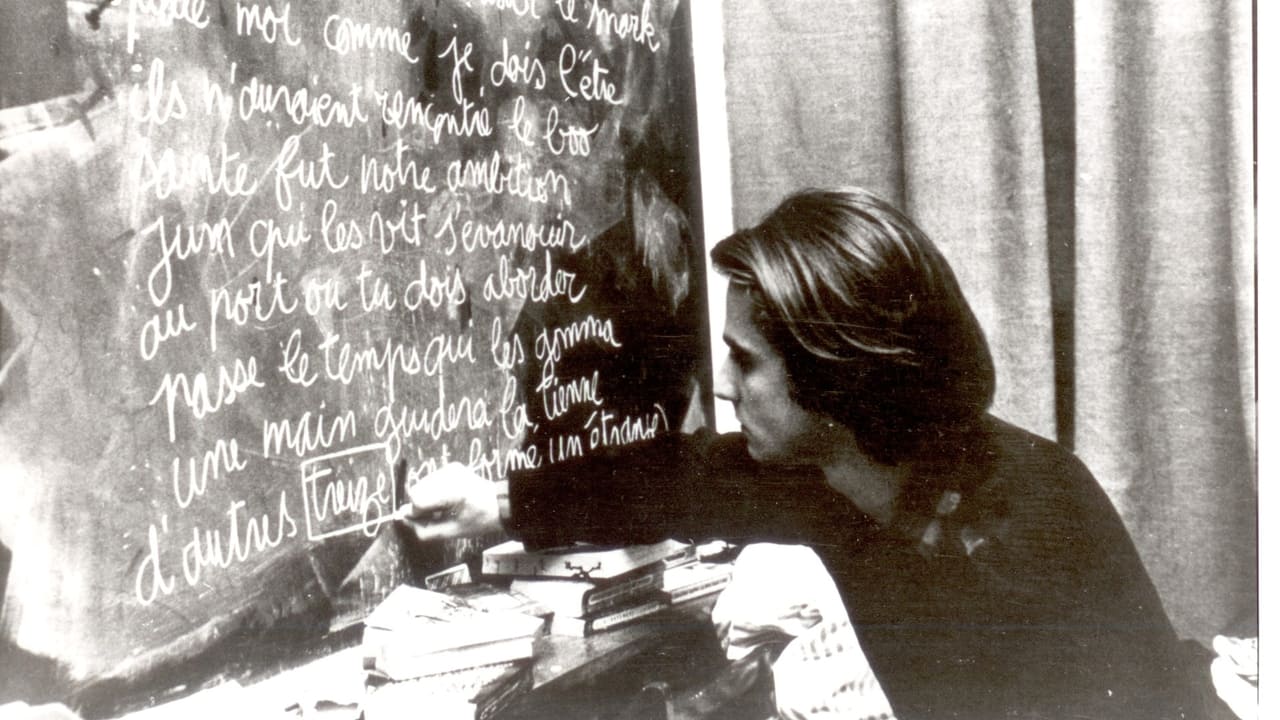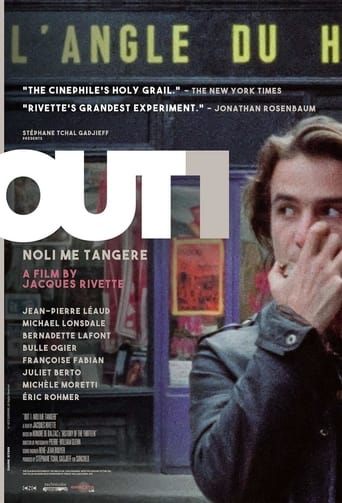



i know i wasted 90 mins of my life.
Entertaining from beginning to end, it maintains the spirit of the franchise while establishing it's own seal with a fun cast
View MoreIt isn't all that great, actually. Really cheesy and very predicable of how certain scenes are gonna turn play out. However, I guess that's the charm of it all, because I would consider this one of my guilty pleasures.
View MoreA story that's too fascinating to pass by...
Shooting in 16 mm in the late 60s-the norm in the TV industry-was an attempt to take film closer to the Real, which Rivette and Godard were doing. In L'amour fou(1969) Rivette 16 mm represents the footage shot by a TV crew documenting the rehearsal process where a group of actors rehearse Shakespeare's Pericles. In Out1 the 16 mm format was not a tool designed to document the work of the actors, but was dictated by the mode of production of the film, commissioned in serial form by French state TV, but when the executives saw the 8-episode, 743 minutes of the finished product, they rejected it. Rivette edited a 255 minute version of the film, Out 1 :Spectre, which had a modest commercial run. The original version, Out 1 : Noli me tang ere became almost invisible, apart from a screening in Le Havre in 1971. Rivette used theatre rehearsals as a structuring device, as in his breakthrough film Paris nous appartient ( 1961)-as much a paranoid portrait of Paris in its time as Out1 had been 10 years later.But he became embarrassed by conventional scripting and made the more free form,unscripted L'amour fou, this opened up his work to improvisation and greater length,with a bare bones scenario.Rivette shot Out 1 after the collapse of the social uprising of May 1968,when a series of strikes by Parisian student unions resulted in a full blown confrontation with the military. The radical hope to change a conservative society ended meekly with De Gaulle's party consolidating power. Out 1 taps into this post-'68 amalgam of malaise, disillusionment and distrust in grand social movements.Paris is turned into disconnected individual groups hermetically sealed off from each other. In Out 1 he wrote an outline blueprint to get funding, but allowed the actors their heads in having them improvise after having chosen their characters themselves.There are two theatre groups rehearsing two Greek plays, 7 Against Thebes and Prometheus Bound, which provide a backbone- a defiance against authority- around which the other diffracted narratives gravitate. One troupe headed by Thomas(Michael Lonsdale) who leads his group through a series of psychosomatic exercises(breathing, improvising,touching,exploring, free-associating about different versions of the text), the other headed by Lili( Michele Moretti) more interested in forms of choral practise and dance, both attempting to recreate the unselfconscious play of children. We later understand they formerly lived together but split up due to differences of method.Thomas appears in the course of the film as both mastermind and victim of his "alternate lifestyle", alternating between several women, dressing down in slacks, T-shirts and Afghan jackets as a bohemian,yet associating with friends from the upper crust( businessmen,lawyers etc.) with whom he may be involved in another game-the hidden plot inspired by Balzac's Histoire des Trieze in which 13 individuals form a secret society to achieve power. Yet he has a spectacular breakdown late in the film,when internal strife within the group forces him to give up the production of Prometheus,when he seeks shelter in a sea-side house owned by a group of friends. He lies in the sand crying and laughing, giving an uninhibited improvised performance. Something of "the Real" is captured in the most artificial sequences of all-rehearsals in enclosed space, where through improvisation the actors are asked to enact their fantasies. The rehearsal scenes are filmed in extremely long shots, capturing facial expressions,drops of sweat, body movements of the actors.For Rivette, narrative cinema is a documentary on the actors. These groups are bonded by ideals of communal togetherness. Intersecting with the lives of the theatre groups and their elusive "13 friends"( do they exist or not or are they vaguer groupings?) are two perfect outsiders existing in the margins, Colin( Jean-Pierre Leaud) and Frederique( Juliet Berto). Colin panhandles in cafés pretending to be a deaf mute, Frederique uses cons to obtain or steal money( or valuable letters) from men. If all the characters are lost these are adrift and loners. Colin is a detective of signs of the secret 13.This leads him to The Corner of Chance a boutique run by Pauline(Bulle Ogier) with whom he falls madly in love. But she has another life and maybe a member of the 13 with a different name, has children, lives in a big house with a nanny and a mysterious husband she never sees. There are class differences. There are moments of high comedy in the pranks and pratfalls of these grifters. Frederique bumps into Renaud, an outsider who stole a lottery win from Lili's group after pretending to be one of them,leading to its dissolution, and they get together briefly and tragically.The two outsiders attempts to get to know the nature of the conspiracy ultimately fail. The Balzacian plot was a MacGuffin, a child's fantasy, a game in which to get caught up. The conspiracy they're all involved in may be their own creation, their projection of an oppressive regime that's all powerful and all knowing, maybe it's all them, they're looking for something to battle against. This is a total immersion in an experience. What you'll certainly take away from this film is the idea of the long take lasting 13 minutes, amazing live street sequences, graffiti and posters, the bohemian modes of dress, a memoir of a time when politics was mainly about philosophy, the way myths are used to understand reality, and the Noli me tang ere theme, the elusiveness of the Real, you get so sucked into this Promethean vat of inspiration and all its characters that perfectly captures a time and place forever. Like Proust's A La Recherche we dip into the sensibility and hang the sense. Rivette lives .This led on to Celine and Julie go boating.
View MoreHere is another film, similar to 1924's la Roue, where narrative structure is not only ignored, but largely obliterated in this 13 hours-long character study, acting study, process study - and film is all the more better for it.On one hand, Out 1 is minimalist (in settings and surroundings) . On one other hand, however, it is elaborate and sprawling (I am referring, obviously, to its massive run-time.)Film spends several hours drawing us, in cinema verite fashion, into the characters' meandering, directionless lives, through conversations filmed in mirrors, and stationary cameras in backseats filming conversations during car rides, lengthy sequences of two theatrical troupes rehearsing Classical stories, and, most amusingly, small kids and curious passersby follow cast and crew during filming.Fiction eventually begins to overtake this pseudo-documentary, as the young man initially referred to in the film's credits as "le jeune sourd-muet" (the young deaf-mute) becomes known as Colin, and his harmonica-playing deaf-mute act is revealed to be just that, an act. He is revealed to be a bit of a conman, a poetic, philosophical con-man (who believes there is a real life secret society known as The Thirteen) much like Frederic is revealed to be a con-woman, stealing correspondence to try to blackmail and extort money from their writers, (and who might have really discovered evidence of the existence of The Thirteen) Neither is who they appear to be- they each have a face to show, and a face to hide. Curiously, despite being prominently featured characters, Colin and Frederic share only one scene together. Even more curious are Pierre and Igor, two major characters in the plot who are never shown at all, either together or by themselves.Interesting colour composition, especially in episodes 4 and 5; Frederic, in white, on a dark green rug, in front of red tapestry hung on the wall behind her, as she begins to wonder about the mysterious Thirteen she has learned of, as the plot (sort of) kicks in; black suit on deep red sofa against pale white wall, simple composition successfully made chaotic by chess board and chess pieces in front of him. Rooftop conversations overlooking Paris and the Seine river ; the city itself and its buildings and its streets become a character in its own right.But, is there really anything to the Balzac-inspired Thirteen, are they real and trying to control all of Paris, or is this just a search for some purpose (unravelling this mystery) in their meandering lives?We, the audience, try to understand the crisscrossing and tangled narratives and characters, much the same as Colin tries to understand the Thirteen. We are trying to unravel a mystery to. But it is almost of no matter if The Thirteen exists or not, just dive into the characters' lives for the duration of its thirteen hours runtime. This is not plot- or character-driven, it is process- driven. The process of filmmaking,
View MoreI loved this movie! So worth the long running time. I need help with the ending though....*SPOILER*The final shot of Marie at the end - Is this to suggest that she is still searching for Renaud? or possibly that she was the one who wanted to reinvigorate the 13? (she seemed to be the one who delivered the initial letter to Colin in the first place) I don't quite understand it, but I know I really liked it. So if anyone has seen this and remembers it or has just seen it, please elaborate on the ending.Thanks
View MoreThis is the very La Nouvelle Vague.One of the best films of the New Wave and I dare say one of the first ten ever made! Why? The atmosphere, the story,the actors (actress) are all brilliant. This is the theater, a fairy tale, the life, the film.Paris. Thank you Mr.Rivette.
View More